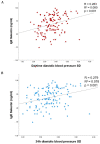E-Selectin Is Associated with Daytime and 24-Hour Diastolic Blood Pressure Variability in Type 2 Diabetes
- PMID: 35203490
- PMCID: PMC8869192
- DOI: 10.3390/biomedicines10020279
E-Selectin Is Associated with Daytime and 24-Hour Diastolic Blood Pressure Variability in Type 2 Diabetes
Abstract
E-selectin is an endothelial cell adhesion molecule involved in vascular inflammation. Elevated E-selectin has been reported in patients with high blood pressure and diabetes. Given the increasing clinical relevance of parameters derived from ambulatory blood pressure monitoring, further investigation of their relationships with E-selectin is of interest. In this study, we aimed to investigate the association between serum E-selectin, office blood pressure and 24 h ambulatory blood pressure parameters in patients with type 2 diabetes. Blood pressure variability was assessed by computing the standard deviation of mean systolic and diastolic blood pressure separately for daytime and nighttime during 24 h ambulatory blood pressure monitoring in a cohort of patients with type 2 diabetes (n = 132). Additionally, were assessed nighttime systolic dipping and pulse pressure separately for daytime, nighttime, and 24 h. Serum E-selectin was measured using the enzyme-linked immunosorbent assay technique. We found that E-selectin was consistently associated with 24 h diastolic blood pressure variability (r = 0.238; p = 0.019) and daytime diastolic blood pressure variability (r = 0.258; p = 0.012), after adjustment for confounding factors. No association of E-selectin with office blood pressure and other 24 h ambulatory blood pressure parameters was observed. In conclusion, endothelial activation indicated by elevated serum E-selectin is associated with increased ambulatory diastolic blood pressure variability in patients with type 2 diabetes.
Keywords: 24 h ambulatory blood pressure monitoring; E-selectin; blood pressure variability; type 2 diabetes mellitus.
Conflict of interest statement
D.C. received fees from AstraZeneca, Sanofi, Eli Lilly and NovoNordisk; C.G.B. reports fees from AstraZeneca, Bayer, Boehringer Ingelheim, Medtronic and Sanofi; G.R. reports fees from AstraZeneca, Boehringer Ingelheim, Eli Lilly, Medtronic, MSD, Novo Nordisk, Roche and Sanofi; A.R. and G.C. have nothing to disclose.
Figures
Similar articles
-
Intercellular adhesion molecule-1 (ICAM-1) associates with 24-hour ambulatory blood pressure variability in type 2 diabetes and controls.Cytokine. 2019 Apr;116:134-138. doi: 10.1016/j.cyto.2019.01.006. Epub 2019 Feb 1. Cytokine. 2019. PMID: 30716657
-
Circadian blood pressure during the early course of type 1 diabetes. Analysis of 1,011 ambulatory blood pressure recordings in 354 adolescents and young adults.Diabetes Care. 1999 Jul;22(7):1151-7. doi: 10.2337/diacare.22.7.1151. Diabetes Care. 1999. PMID: 10388981
-
Pulse pressure is more relevant than systolic and diastolic blood pressure in patients with type 2 diabetes and cardiovascular disease.Clujul Med. 2018 Oct;91(4):408-413. doi: 10.15386/cjmed-972. Epub 2018 Oct 30. Clujul Med. 2018. PMID: 30564016 Free PMC article.
-
Twenty-four-hour ambulatory blood pressure variability and association with ischemic stroke subtypes in the subacute stage.Front Neurol. 2023 Apr 17;14:1139816. doi: 10.3389/fneur.2023.1139816. eCollection 2023. Front Neurol. 2023. PMID: 37139058 Free PMC article.
-
Task Force II: blood pressure measurement and cardiovascular outcome.Blood Press Monit. 2001 Dec;6(6):355-70. doi: 10.1097/00126097-200112000-00016. Blood Press Monit. 2001. PMID: 12055415 Review.
Cited by
-
Association between napping and 24-hour blood pressure variability among university students: A pilot study.Front Pediatr. 2023 Mar 2;11:1062300. doi: 10.3389/fped.2023.1062300. eCollection 2023. Front Pediatr. 2023. PMID: 36937964 Free PMC article.
-
AMINO ACIDS METABOLOMIC SIGNATURE OF BLOOD PRESSURE VARIABILITY In Type 2 Diabetes.Acta Endocrinol (Buchar). 2022 Oct-Dec;18(4):494-501. doi: 10.4183/aeb.2022.494. Acta Endocrinol (Buchar). 2022. PMID: 37152871 Free PMC article.
-
Time to Change Our Viewpoints to Assess Renal Risks in Patients with Solitary Kidneys beyond Traditional Approaches?J Clin Med. 2023 Oct 31;12(21):6885. doi: 10.3390/jcm12216885. J Clin Med. 2023. PMID: 37959350 Free PMC article.
References
Grants and funding
LinkOut - more resources
Full Text Sources



